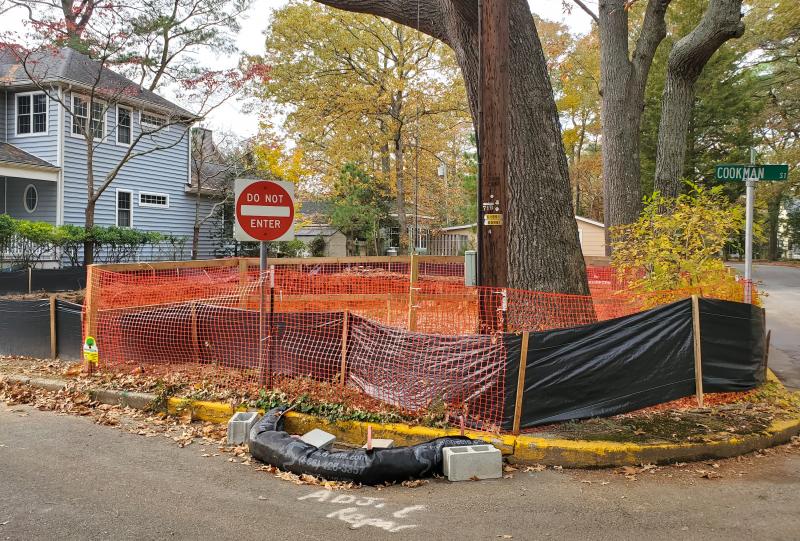Rehoboth passes stormwater construction regulations

Rehoboth commissioners unanimously passed an ordinance requiring the use of stormwater protection measures during construction that disturbs more than 1,000 square feet of land.
Projects disturbing more than 5,000 square feet are already subject to stormwater management plans approved by the Sussex County Conservation District.
During a commissioner meeting Nov. 15, Public Works Director Kevin Williams said the new ordinance takes the same measures at the 5,000-square-foot level and applies them to a smaller property.
City Solicitor Glenn Mandalas began the discussion by reviewing a number of changes that had been written into the ordinance since it was last discussed by commissioners. All of the changes were adopted.
The changes included replacing the phrase “silt fencing” with “appropriate perimeter protection”; requiring approval of a stormwater plan before a building permit can be issued; prominently displaying a sign with city contact information if erosion and runoff is noticed; forbidding construction vehicles from washing out in the street; and the addition of a fine of $200 a day for violating the ordinance.
As proposed, the ordinance had required stormwater protection measures for any construction activity disturbing more than 2,500 square feet. Ultimately, and after a discussion on the definition of disturbed, the square footage was changed to 1,000 square feet because commissioners decided that would leave no room for doubt as to how much land had been disturbed.
Sallie Forman, Save Our Lakes Alliance 3 founder, was the reason for much of the stricter rules. She said the new wording is a great improvement, but the ordinance will only be as good as the city’s enforcement.
Commissioner Lisa Schlosser said she was concerned about imposing new rules on homeowners or construction companies who were already working.
Assistant Building Official Matthew Janis said he would be judicious in handing out fines to sites already under construction. He said he would first warn and educate, and then fine only after multiple offenses.
Primarily, said Janis, the passage of this ordinance gives the city the ability to enforce.
As part of the education process, contractor Allen Walker said commissioners should mail a copy of the ordinance to all construction companies with a building permit in the city. He said sometimes subcontractors don’t always listen to general contractors about changes that have been made.
Votes on administrative variances, adoption of 2018 building code postponed
Prior to voting in favor of the stormwater regulations, commissioners held a public hearing on a proposed administrative variance that would allow the city’s building inspector to administratively grant a building setback variance, side-yard variance, or rear-yard variance that does not exceed 1 foot.
Not one member of the public spoke in favor of the ordinance as written. Residential property owner Marie Hatkevich outlined a number of her concerns, which were supported by others who spoke. She said she was concerned the proposal does not exclude commercial or new construction, and that the 10 days of notification to adjacent neighbors was not adequate.
As written, the ordinance calls for a $50 administration fee. Former Commissioner Walter Brittingham said the fee should be at least $100 because city staff would have to spend time evaluating the request. The city shouldn’t lose money, he said.
At the end of the public hearing, commissioners agreed with some public suggestions and tasked Mandalas with incorporating them into the ordinance – specifically wording saying no new or commercial construction, increasing the fee to $100 and sending a certified letter to adjacent property owners with a 30-day notice of the request.
There was no discussion on the proposed adoption of the 2018 International Building Code. At the beginning of the meeting, Mayor Paul Kuhns removed the item from the agenda because, he said, commissioners were waiting for city building officials to get them a list of changes associated with the updated building code.
Sprinkler systems for new residential construction are in the 2012 version of the code, but city commissioners excepted it as a requirement when it was adopted years ago. City building officials have recommended removing the exception with the adoption of the 2018 version.
Both the administrative variances and adoption of the 2018 International Building Code are expected to be on the agenda of the commissioners December workshop, which is scheduled for Monday, Dec. 9.
Chris Flood has been working for the Cape Gazette since early 2014. He currently covers Rehoboth Beach and Henlopen Acres, but has also covered Dewey Beach and the state government. He covers environmental stories, business stories and random stories on subjects he finds interesting, and he also writes a column called Choppin’ Wood that runs every other week. He’s a graduate of the University of Maine and the Landing School of Boat Building & Design.






















































